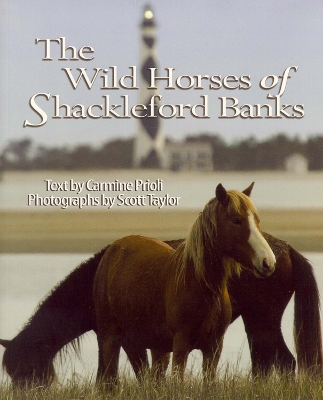There is an island at the remote southern end of North Carolina's Outer Banks where you might see wild horses playing in the surf, or grazing within view of the Cape Lookout Lighthouse, or scattering into a rare, weather-beaten maritime forest. The horse herd on Shackleford Banks has long been a subject of fascination. Today, it is both one of the wildest and most controlled animal populations on earth. An array of scientists sees to it that the horses are born, battle for social rank, forage for food, suffer the elements, and die without human interference. At the same time, to protect the island from overgrazing, these scientists practice the 21st-century paradox of "wilderness management"-a careful plan of genetic testing and immunocontraception to maintain a target population of 120 to 130 healthy horses. Mystery and controversy have always surrounded the Shackleford horses. Some experts offer evidence that they are the descendants of horses cast off foundering Spanish galleons. Others cite proof that they are of much more recent origin. Many people see them as symbols of bedrock American values like freedom and self-sufficiency. But over the years, some have argued that they pose a threat to the island's ecology and should be banned as feral goats, sheep, and cattle were long ago. There is even disagreement over what they are. Scientists say they're horses, but many people will forever insist they're ponies. The Wild Horses of Shackleford Banks is a comprehensive overview of the famous herd-its possible origins and development, its hardiness in the face of hurricanes, its complex relationship with humans, its hard-won protection within Cape Lookout National Seashore. The book's plentiful illustrations-both archival and contemporary-show why the Shackleford horses are so beloved among visitors to the Outer Banks. *A portion of the proceeds from The Wild Horses of Shackleford Banks will be contributed to the Foundation for Shackleford Horses, Inc.
Carmine Prioli was born and raised in Boston, MA. He received his B.A. from Suffolk University in 1968, his master's from Boston College in 1971, and his Ph.D. from the State University of New York at Stony Brook in 1975, all in English. Prioli moved to North Carolina in 1977 to teach at North Carolina State University. From 2003 to 2005, he edited the North Carolina Folklore Journal. He is the author of Hope for a Good Season: The Ca'e Bankers of Harkers Island and editor of The Poems of General George S. Patton, Jr.: Lines of Fire. He also co-edited Life at the Edge of the Sea: Essays on North Carolina's Coast and Coastal Culture with Candy Beal. He lives in Chapel Hill with his wife of twenty-nine years, Elizabeth, and has two sons, John and Andrew. Scott Taylor is a graduate of the University of North Carolina at Chapel Hill. He was a photographer for the Chapel Hill News and the Duke University Marine Laboratory before opening Scott Taylor Photography, along with his own gallery and studio, in Beaufort, North Carolina.
- ISBN10 0895873346
- ISBN13 9780895873347
- Publish Date 15 March 2007
- Publish Status Active
- Publish Country US
- Imprint John F Blair Publisher
- Format Paperback (US Trade)
- Pages 144
- Language English
